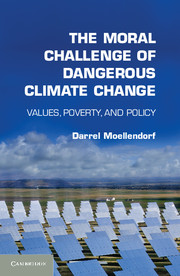Book contents
- Frontmatter
- Dedication
- Contents
- Acknowledgments
- Introduction
- 1 Danger, Poverty, and Human Dignity
- 2 The Value of Biodiversity
- 3 Risks, Uncertainties, and Precaution
- 4 Discounting the Future and the Morality in Climate Change Economics
- 5 The Right to Sustainable Development
- 6 Responsibility and Climate Change Policy
- 7 Urgency and Policy
- Afterword Frankenstorms
- Appendix A The Antipoverty Principle and the Non-Identity Problem
- Appendix B Climate Change and the Human Rights of Future Persons: Assessing Four Philosophical Challenges
- Appendix C The Right to Sustainable Development versus International Paretianism
- Appendix D Declaration on Climate Justice
- Bibliography
- Index
- References
5 - The Right to Sustainable Development
Published online by Cambridge University Press: 05 June 2014
- Frontmatter
- Dedication
- Contents
- Acknowledgments
- Introduction
- 1 Danger, Poverty, and Human Dignity
- 2 The Value of Biodiversity
- 3 Risks, Uncertainties, and Precaution
- 4 Discounting the Future and the Morality in Climate Change Economics
- 5 The Right to Sustainable Development
- 6 Responsibility and Climate Change Policy
- 7 Urgency and Policy
- Afterword Frankenstorms
- Appendix A The Antipoverty Principle and the Non-Identity Problem
- Appendix B Climate Change and the Human Rights of Future Persons: Assessing Four Philosophical Challenges
- Appendix C The Right to Sustainable Development versus International Paretianism
- Appendix D Declaration on Climate Justice
- Bibliography
- Index
- References
Summary
“Those Greek were superficial – out of profundity.”
– Friedrich NietszcheThe seventeenth Conference of the Parties of the United Nations Framework Convention on Climate Change (UNFCCC) – meeting in Durban, South Africa, in 2011 – agreed on the Durban Platform for Enhanced Action, which contains a commitment “to develop a protocol, another legal instrument or an agreed outcome with legal force under the Convention applicable to all Parties.” The negotiations around such a protocol will be conducted within the framework of norms expressed in the Convention. Analogous to a game, these norms are the rules according to which the parties to the Convention have agreed to play when deliberating about joint action and supplemental treaties, such as the one they committed to develop in the Durban Platform. If taken seriously, the norms would play an important role in constraining negotiations, thereby narrowing the range of disagreement.
This chapter discusses one especially important norm for the morality of climate change policy expressed in the Convention; the right to sustainable development is stated in Article 3, paragraph 4:
The Parties have a right to, and should, promote sustainable development. Policies and measures to protect the climate system against human-induced change should be appropriate for the specific conditions of each Party and should be integrated with national development programmes, taking into account that economic development is essential for adopting measures to address climate change.
Sustainable development is understood in many different ways. But in the context of the Convention and other related UN resolutions, its meaning is fairly determinate. I call the conception of the right to sustainable development more or less fixed by this context the institutional conception of the right to sustainable development in order to distinguish it from the many other understandings of sustainable development in use.
- Type
- Chapter
- Information
- The Moral Challenge of Dangerous Climate ChangeValues, Poverty, and Policy, pp. 123 - 151Publisher: Cambridge University PressPrint publication year: 2014



